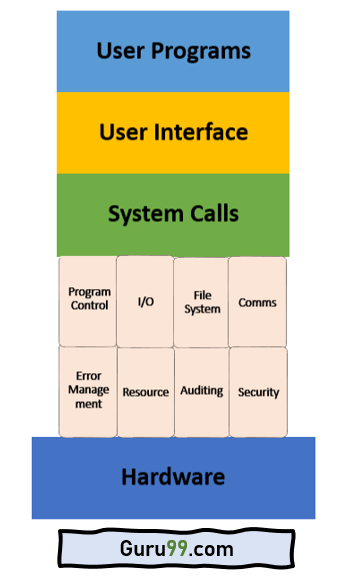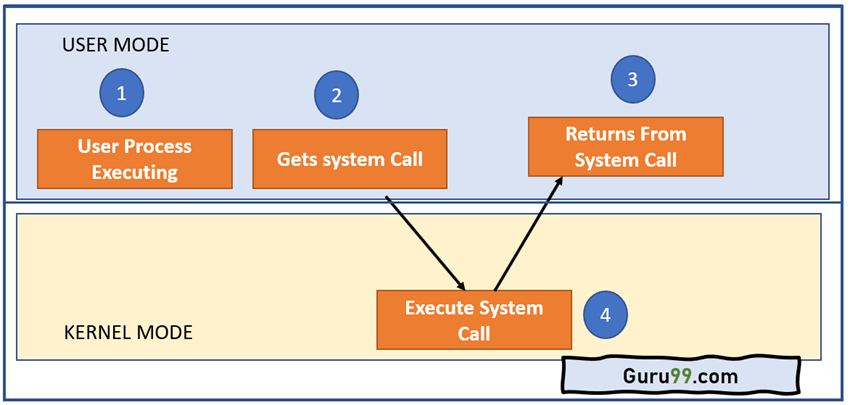SDLC
Difference between Primary and Secondary Memory
What is Memory? Memory is very much like our brain as it is used to store data and instructions. Computer...
A system call is a mechanism that provides the interface between a process and the operating system. It is a programmatic method in which a computer program requests a service from the kernel of the OS.
System call offers the services of the operating system to the user programs via API (Application Programming Interface). System calls are the only entry points for the kernel system.
In this operating system tutorial, you will learn:

For example if we need to write a program code to read data from one file, copy that data into another file. The first information that the program requires is the name of the two files, the input and output files.
In an interactive system, this type of program execution requires some system calls by OS.
Here are steps for System Call:

As you can see in the above-given diagram.
Step 1) The processes executed in the user mode till the time a system call interrupts it.
Step 2) After that, the system call is executed in the kernel-mode on a priority basis.
Step 3) Once system call execution is over, control returns to the user mode.,
Step 4) The execution of user processes resumed in Kernel mode.
Following are situations which need system calls in OS:
Here are the five types of system calls used in OS:
This system calls perform the task of process creation, process termination, etc.
Functions:
File management system calls handle file manipulation jobs like creating a file, reading, and writing, etc.
Functions:
Device management does the job of device manipulation like reading from device buffers, writing into device buffers, etc.
Functions
It handles information and its transfer between the OS and the user program.
Functions:
These types of system calls are specially used for interprocess communications.
Functions:
Here are general common rules for passing parameters to the System Call:
In some systems, a process needs to wait for another process to complete its execution. This type of situation occurs when a parent process creates a child process, and the execution of the parent process remains suspended until its child process executes.
The suspension of the parent process automatically occurs with a wait() system call. When the child process ends execution, the control moves back to the parent process.
Processes use this system call to create processes that are a copy of themselves. With the help of this system Call parent process creates a child process, and the execution of the parent process will be suspended till the child process executes.
This system call runs when an executable file in the context of an already running process that replaces the older executable file. However, the original process identifier remains as a new process is not built, but stack, data, head, data, etc. are replaced by the new process.
The kill() system call is used by OS to send a termination signal to a process that urges the process to exit. However, a kill system call does not necessarily mean killing the process and can have various meanings.
The exit() system call is used to terminate program execution. Specially in the multi-threaded environment, this call defines that the thread execution is complete. The OS reclaims resources that were used by the process after the use of exit() system call.
| Categories | Windows | Unix |
|---|---|---|
| Process control | CreateProcess() ExitProcess() WaitForSingleObject() | fork() exit() wait() |
| Device manipulation | SetConsoleMode() ReadConsole() WriteConsole() | loctl() read() write() |
| File manipulation | CreateFile() ReadFile() WriteFile() CloseHandle() | Open() Read() write() close!) |
| Information maintanence | GetCurrentProcessID() SetTimer() Sleep() | getpid() alarm() sleep() |
| Communication | CreatePipe() CreateFileMapping() MapViewOfFile() | Pipe() shm_open() mmap() |
| Protection | SetFileSecurity() InitlializeSecurityDescriptor() SetSecurityDescriptorGroup () | Chmod() Umask() Chown() |
What is Memory? Memory is very much like our brain as it is used to store data and instructions. Computer...
Music visualizers are software that can generate animated imagery that follows loudness, frequency spectrum,...
Definition of Abstraction Abstraction is an OOP concept that focuses only on relevant data of an...
$20.20 $9.99 for today 4.6 (118 ratings) Key Highlights of ASP.NET Tutorial PDF 157+ pages eBook...
What is UNIX? The UNIX OS was born in the late 1960s. AT&T Bell Labs released an operating system called...
What is crontab? Cron is named after Greek word "Chronos" that is used for time. It is a system...